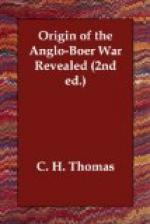Girls as well as boys learn to ride on horseback when quite young. It is quite a usual thing to see women riding astride fashion, collecting sheep and cattle, or driving their horse carts and spiders (carriages), unattended by males, over distances of over twenty and thirty miles—women spanning in ox-teams to their travelling wagons, driving them with long whips on journeys occupying one or more days. During the Kaffir wars the Boers used to trek (travel) in bodies with their wagons, which would serve to form a laager or fort, their families and belongings being placed in the centre. During an attack the women would attend to the men’s wants, reload their rifles, and even take a more active part in repelling the enemy, many of them being also crack shots. The above-stated efficient and hardy habits with men and women apply more to the people in the two Republics, and particularly so to those of the Transvaal, while the Colonial Boers on the whole have had no such experience, but instead have lived in uninterrupted peace and comfort for generations, and may be classed with farmers of any other well-governed and protected country or colony. The Boer farmers in the northern portions of the Cape Colony, however, approximate to those of the Orange Free State in hardy habits and ability to fend for themselves when in difficulty. But with the Transvaal Boers the training incident to wars, hunting, and nomadic movements has been more sustained, and they are thus in best form and fitness of efficiency compared with all the rest.
In the Orange Free State nearly every man above fifty years of age has had the experience of the three years’ Basuto war in 1865-67, and almost all above forty are very expert huntsmen and crack shots. Quite a good number have also taken part in the Transvaal war against the English in 1880; the rest have been trained by the elder veterans, and, though not so well seasoned, are good horsemen, expert with the rifle, and competent in the field. As to the Transvaalers, the men have all had plenty of field practice before the previous war with England and since, in subduing formidable Kaffir rebellions, the last being the operations against the Magato chief, which terminated just before the outbreak of the present Anglo-Boer war.
Besides this, game had continued longer in abundance in the Transvaal, and is still hunted with success in the northern low veldt and in the adjacent Portuguese territory. Added to this, the young Boers in the Cape Colony, Natal, Orange Free State, and Transvaal have been encouraged to attain proficiency in rifle practice and competence in the field, ostensibly for the gratification of keeping up old traditions, but in reality to be prepared for the struggle against England meditated by the Afrikaner Bond.




